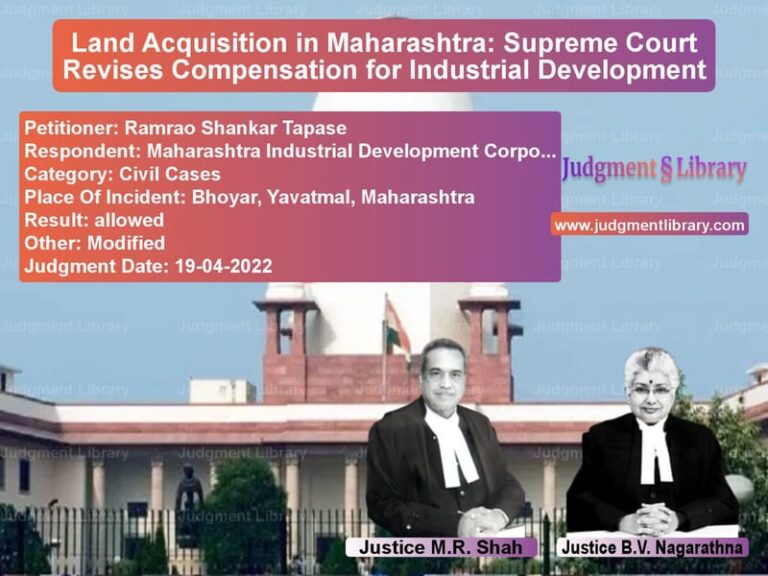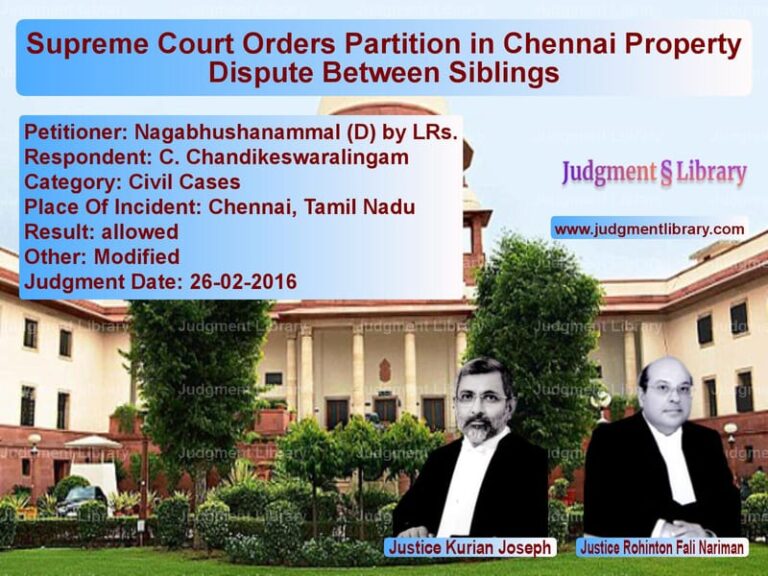Madhya Pradesh Political Crisis: Supreme Court’s Ruling on Trust Vote and Governor’s Powers
The Supreme Court of India, in its ruling in Shivraj Singh Chouhan & Ors. vs. Speaker, Madhya Pradesh Legislative Assembly & Ors., addressed a crucial political dispute regarding the resignation of 22 MLAs and the subsequent order by the Governor to conduct a floor test in the legislative assembly. The judgment reinforced constitutional principles on the role of the Governor, the Speaker’s authority, and the process for determining a government’s majority.
Background of the Case
The political turmoil in Madhya Pradesh began when 22 sitting MLAs of the ruling Congress government submitted their resignations in March 2020, effectively reducing the numerical strength of the government. Following these resignations, the Governor of Madhya Pradesh directed the then Chief Minister, Kamal Nath, to prove his majority in the Assembly through a floor test.
The Chief Minister resisted the Governor’s directive, arguing that the Speaker must first verify the resignations of the MLAs before a floor test could be held. The Speaker deferred the decision on the resignations, leading to legal intervention. The opposition leader Shivraj Singh Chouhan and BJP legislators filed a petition before the Supreme Court, seeking an immediate floor test to determine the government’s legitimacy.
The case raised several constitutional questions:
- Can the Governor direct a sitting Chief Minister to conduct a floor test?
- Does the Speaker have the sole authority to decide on MLA resignations before a trust vote?
- What is the role of the judiciary in determining legislative majority?
Arguments by the Petitioners (Shivraj Singh Chouhan & BJP Legislators)
The petitioners, represented by senior counsel, argued:
- The mass resignation of 22 MLAs indicated that the Congress government had lost its majority in the Assembly.
- The Governor had the constitutional authority to direct a floor test when there was doubt over the government’s stability.
- Delaying the trust vote allowed the ruling party to engage in political maneuvering to retain power unfairly.
- The Supreme Court, in previous cases such as SR Bommai vs. Union of India (1994), had ruled that a floor test was the best way to determine a government’s majority.
Arguments by the Respondents (Speaker and Congress Government)
The respondents, including the Speaker of the Madhya Pradesh Legislative Assembly and Congress leaders, countered:
- The resignations were allegedly coerced, and the Speaker needed time to verify their authenticity.
- The Governor’s order for a trust vote was unconstitutional as it bypassed the Speaker’s authority.
- The judiciary should not interfere in legislative matters, which fall under the domain of the Speaker.
- According to Kihoto Hollohan vs. Zachillhu (1992), the Speaker had exclusive jurisdiction over matters of resignation and disqualification of MLAs.
Supreme Court’s Observations and Ruling
The Supreme Court, after hearing both sides, ruled as follows:
- The Governor has the authority to direct a trust vote when there is genuine doubt about the government’s majority.
- The Speaker’s power to decide on resignations cannot be used to delay a trust vote indefinitely.
- A floor test is the most democratic method to determine the support of the legislative assembly.
- The Court cited Nabam Rebia vs. Deputy Speaker, Arunachal Pradesh Legislative Assembly (2016), reinforcing that the Governor can act independently to safeguard democracy.
The Court directed the Madhya Pradesh Assembly to conduct a trust vote immediately, leading to the fall of the Congress government and the swearing-in of Shivraj Singh Chouhan as the Chief Minister.
Key Takeaways from the Judgment
- Governor’s Role in a Political Crisis: The judgment reaffirms that the Governor can intervene when the government’s majority is in doubt.
- Speaker’s Limited Discretion: The Speaker cannot indefinitely delay decisions on resignations to prevent a trust vote.
- Judiciary’s Role in Legislative Disputes: Courts can direct a floor test to ensure democratic principles are upheld.
- Floor Test as a Democratic Tool: The ruling upholds the principle that legislative confidence must be tested in the Assembly, not in the courts.
Conclusion
The Supreme Court’s ruling in Shivraj Singh Chouhan & Ors. vs. Speaker, Madhya Pradesh Legislative Assembly & Ors. is a defining precedent in political and constitutional law. By enforcing a trust vote, the Court ensured that the legitimacy of the government was determined democratically. The decision prevents potential misuse of constitutional offices to delay or manipulate political transitions.
This ruling will serve as a guiding principle in future cases where political instability leads to questions about the government’s majority in a legislative assembly.
Petitioner Name: Shivraj Singh Chouhan & Ors..Respondent Name: Speaker, Madhya Pradesh Legislative Assembly & Ors..Judgment By: Justice Dhananjaya Y Chandrachud, Justice Hemant Gupta.Place Of Incident: Madhya Pradesh.Judgment Date: 13-04-2020.
Don’t miss out on the full details! Download the complete judgment in PDF format below and gain valuable insights instantly!
Download Judgment: Shivraj Singh Chouha vs Speaker, Madhya Prad Supreme Court of India Judgment Dated 13-04-2020.pdf
Direct Downlaod Judgment: Direct downlaod this Judgment
See all petitions in Legislative Powers
See all petitions in Public Interest Litigation
See all petitions in Separation of Powers
See all petitions in Fundamental Rights
See all petitions in Constitution Interpretation
See all petitions in Judgment by Dhananjaya Y Chandrachud
See all petitions in Judgment by Hemant Gupta
See all petitions in allowed
See all petitions in supreme court of India judgments April 2020
See all petitions in 2020 judgments
See all posts in Election and Political Cases Category
See all allowed petitions in Election and Political Cases Category
See all Dismissed petitions in Election and Political Cases Category
See all partially allowed petitions in Election and Political Cases Category







